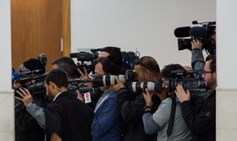

Publications Regarding Democracy and technology
Articles

The Fabricated Bennett/Lapid Image and the New Age of Election Propaganda
Written By: Dr. Tehilla Shwartz Altshuler
A fabricated AI-generated image of Naftali Bennett and Yair Lapid posted on the Likud's social media accounts is a clear demonstration of a dangerous new form of election propaganda. Urgent steps must be taken to prohibit the use of such materials against one's political opponents.

The Bondi Attack and the Cognitive Fog of Online Antisemitism
Written By: Dr. Tehilla Shwartz Altshuler
In the aftermath of the Bondi beach Chanukkah shooting, we saw, yet again, an online ecosystem primed to flood the system with antisemitic content and disinformation about the attack. Policymakers must set basic conditions for safeguarding democratic societies in a world where physical attacks and digital narratives are so deeply intertwined.

Microsoft's Kill Switch Over Israel's National Security
Written By: Dr. Tehilla Shwartz Altshuler
Microsoft's termination of certain cloud services by the IDF 8200 unit exposes other vulnerabilities in Israel's national security infrastructure. It's already impacted signal intelligence – without decisive action, the battle field and home front may be next.

Flying Out of Microsoft’s Cloud
Written By: Dr. Tehilla Shwartz Altshuler
Why Microsoft, Google, and Amazon hold the keys to Israel's sovereignty.

The Impact of AI on Israeli Employment
Written By: Gilad Be'ery
The Head of IDI's Economic Reform Program Gilad Be'ery speaks to Naomi Segal on Kan Radio English about his new analysis on business adoption of AI in Israel. The analysis, based on a first-of-its-kind Central Bureau of Statistics (CBS) survey, finds that 28% of Israeli businesses have used AI in the past six months, and that AI is beginning to do the tasks of humans in the workplace. Gilad discusses the implications of these findings and what might lie ahead for Israeli workers. To read the full analysis, click here.

Antisemitism is no longer just an ideology — it’s an economic model
Written By: Dr. Tehilla Shwartz Altshuler
Modern antisemitism is no longer confined to fringe forums or offensive symbols painted on synagogues: it is now a profit-driven digital economy, powered by crypto, AI, and decentralized platforms. To confront it effectively, we must regulate the infrastructure that monetizes hate—not just educate against it.

Anatomy of a Spear-Phishing Attack
Written By: Dr. Tehilla Shwartz Altshuler
The Head of IDI's Democracy in the Digital Age Program was the target of an attempted cyber-attack. The highly specific, human, and professional nature of the attack serves as a reminder that technical defenses only go so far. The tools used are becoming more sophisticated and targeted to the human psyche – so, too, must our defenses.

Jews as the Canary in the AI Coalmine
Written By: Dr. Tehilla Shwartz Altshuler
Antisemitism is being intensified by algorithm-driven social media and unregulated AI, making tech policy the decisive arena for combating hate.

Fake or Not Project for Media Literacy: Knowledge, Tools, and Skills for Educators in Educational and Social Spaces.
Written By: Education Policy Program
The "Fake or Not" initiative emerged after the outbreak of the "Iron Swords" war, from an understanding of the need to emphasize media literacy in educational and social institutions.

Israel's Cyber Front Is Unprepared
Written By: Dr. Tehilla Shwartz Altshuler
From network hacking to disinformation, Israel is unprepared for combat in today's fourth dimension of warfare.

Israel's Defense Establishment Must Rethink its Conception of Technological Superiority
Written By: Dr. Tehilla Shwartz Altshuler
The paradigm of reliance on technology for our security seems to have led us to a point in which infinite data points and technological tools are at our disposal failed to produce a response. It is of course essential to continue investing in technological superiority, but this needs to be done with a clearer head.

The Path to Victory is Through Silicon Valley
Written By: Dr. Tehilla Shwartz Altshuler
The ongoing war highlights the transformation of technology giants, once American-based corporations, into international entities. Within the Western aid package to Israel, it is imperative to enforce global accountability upon these companies

What lies behind Karhi's radical broadcasting bill?
Written By: Dr. Tehilla Shwartz Altshuler
The Kan public broadcaster has joined forces with Israel’s 2 main commercial TV channels, 12 and 13, to campaign against the bill being promoted by Communications Minister Shlomo Karhi to overhaul the country’s media market.

Explainer: Israel's High Court of Justice and the Incapacitation Law
Written By: Dr. Amir Fuchs
The term "incapacitation" refers to a situation in which a government official is unable to perform their duty. The previous version of the law did not detail what constitutes incapacitation, nor who is authorized to declare incapacitation. The current version is accused of being personal and political.

“Regulations” for the New Year
Written By: Dr. Tehilla Shwartz Altshuler
On the eve of the Jewish New Year, what can we wish for regarding Israeli regulatory policy? Here are some possible policy proposals.

NSO in Israel: Would You Let the Police Handle Uranium?
Written By: Dr. Tehilla Shwartz Altshuler, Adv. Amir Cahane
NSO-Israel Police affair proves we need to rethink the way we oversee surveillance technologies. The solution: Israel needs a privacy czar

The NSO Scandal Should be an Earthquake for the Israel Police
Written By: Dr. Tehilla Shwartz Altshuler
Recent media reports alleging that the police are using controversial surveillance software to spy on Israeli citizens has troubling implications and the current Protection of Privacy Law is not equipped to cope with today’s reality. Israel badly needs new legislation that is up to the challenges of the information age.

Facebook is toxic in Hebrew too — Israelis must be protected
Written By: Dr. Tehilla Shwartz Altshuler
It's up to lawmakers to enact privacy protection, outlaw predatory marketing and hold social media providers in Israel accountable for the harm they do

Online Platforms are Making Up Free Speech Rules as They Go—and It’s Concerning
Written By: Prof. Yuval Shany
Banning users from social media platforms raises concerns about free speech protections online

Israel Reauthorizes Shin Bet’s Coronavirus Location Tracking
Written By: Adv. Amir Cahane
In its attempts to contain the spread of the novel coronavirus, Israel has employed a measure that has not been used by any other democratic country. Since mid-March, the Israeli government has sought the assistance of the General Security Service (also known as the Israeli Security Agency, the ISA, the Shabak or Shin Bet) in conducting epidemiological investigations by providing the Ministry of Health with the routes of coronavirus carriers and lists of individuals with whom they have been in close contact. The ISA queries its communication metadata database to identify the route of confirmed carriers and the individuals with whom they have been in close contact.

Fighting the Coronavirus is Impacting Our Privacy
Written By: Dr. Tehilla Shwartz Altshuler
Information is power. Governments and private entities that have access to vast troves of information have vast power.

Surveillance During a Pandemic - International Comparison
Written By: Dr. Tehilla Shwartz Altshuler, Dr. Rachel Aridor-Hershkovitz
Israel has authorized its secret services to carry out extensive surveillance of civilians in the battle against the Coronavirus. In most other democracies there is dedicated legislation to deal with information gathering during the epidemic. IDI's experts complied a comparative review.

Protecting the World’s Most Valuable Commodity
Written By: Dr. Tehilla Shwartz Altshuler
The sharing of medical data has extremely positive potential. It can help with predicting rare diseases, early detection and more exact diagnoses than are possible with existing medical capabilities.

We Need to Talk about Cameras Right Now
Written By: Dr. Tehilla Shwartz Altshuler
They are everywhere, argued the PM after pushing to install them in polling stations. He's right, and that's exactly the problem

The Crossroads between Ethics and Technology
Written By: Dr. Tehilla Shwartz Altshuler
"Israel and other Western Democracies must carefully consider the negative ramifications of excelling in technology while disregarding moral and ethical questions." Read Dr. Tehilla Shwartz Altshuler's latest in Techcrunch

So You Want to Lead the Country? Show Us Your Calendars
Written By: Adv. Alona Vinograd
The public - your employer - has the right to know how often you skip the Knesset plenum or travel abroad. Election date is getting closer and there is no better time than now, to give some thought to the public’s right to information

The Municipal Elections 2018: Digital Resilience
Written By: Dr. Tehilla Shwartz Altshuler, Dr. Guy Lurie
The digital domain has developed into something of a wild west for election campaigning in recent years. While there are strict laws governing the press, radio, and television, there are almost no restrictions on online campaigning, such as on the forms of advertising permitted, the use of personal data, and advertising budgets. This lack of regulation has already been shown to potentially affect election results, and may lead to the misuse of information on residents, routinely collected by the municipality as part of its function by those in positions of power in local government.

If Meitav's Website Was Hacked - the Breach Was Almost Inevitable
Written By: Dr. Tehilla Shwartz Altshuler
The breach of IDF’s Meitav website was almost inevitable, in light of inadequate attention to the need to protect sensitive personal information and the lack of supporting legislation in Israel.

Public trust in mass media - Breaking, turning and soaring?
Written By: Dr. Tehilla Shwartz Altshuler
Last year the Democracy Index pointed to an all-time low in public trust in the media. However, in 2017 it seems that the trend has reversed. Why?

Privacy Matters in the Digital Age
Written By: Dr. Tehilla Shwartz Altshuler
Priavcy is a requirement for the proper functioning of any democratic society.

The Mobileye Acquisition is Proof that AI Needs Guidelines
Written By: Dr. Tehilla Shwartz Altshuler
The sale of Mobileye to Intel is not surprising when you consider that last year MIT Technology Review ranked the Jerusalem-based company as one of the 10 smartest companies in the world. As such, the real story is the relationship between government, society, and technology.

Time for the Start-Up Nation to Build a Start-Up Government
Written By: Dr. Tehilla Shwartz Altshuler
Earlier this year, Prime Minister Benjamin Netanyahu announced that “the time has come for the Start-Up Nation to also have a Start-Up Government.” I agree. But can it be done?

Innovation was the Epic Fail of 2016
Written By: Dr. Tehilla Shwartz Altshuler
In Israel, we talk a lot about innovation. But what does the term really mean?

Start-up Nation Central, the Israel Democracy Institute and the Israel Innovation Authority Praise the Government’s Decision to Increase Governmental Interoperability as an Important Step for the Israeli Civil Service
The Israel Democracy Institute (IDI), the Israel Innovation Institute (III) and Start-up Nation Central (SNC) said the government’s recent decision to approve implementing new and innovative interoperability strategies is an important step that could lead to a major breakthrough.

Israel’s Most Effective Political Lobby: Right-wing Nationalists on Social Media
Written By: Dr. Tehilla Shwartz Altshuler
Elor Azaria’s case shows how online pressure by extremist voices can swiftly go viral in the Israeli mainstream, forcing politicians to choose: Play catch up or resist, but at great personal cost.

Policy Statement: The 'Facebook Bill' (Hebrew)
Written By: Dr. Tehilla Shwartz Altshuler
Ahead of a recent discussion by the Ministerial Committee on Legislation on the “Facebook Bill,” IDI’s Dr. Tehilla Shwartz Altshuler wrote a policy statement in which she called the bill non-applicable to the modern day. She said the bill is likely to cause disproportionate censorship through what will be dysfunctional legal proceedings.

Healthy Public Curiosity vs. Official Privacy
Written By: Dr. Tehilla Shwartz Altshuler
Dr. Tehilla Shwartz Altshuler argues that the Protection of Privacy Law does not create an absolute right, and whoever enters public life must be able to give up parts of his/her privacy, no matter how difficult that might be. This op-ed originally appeared in the Atlanta Jewish Times.

The Prime Minister’s Digital Literacy
Written By: Dr. Tehilla Shwartz Altshuler
When a sizable portion of our decision-makers have that difficulty, and “digital illiteracy” becomes evident in the upper echelons where decisions are made, we’ve got a problem. This article was first published by The Jerusalem Post.

The Real Reason for the Turkish Coup’s Failure
Written By: Dr. Tehilla Shwartz Altshuler
Dr. Tehilla Shwartz Altshuler argues that the main reason the coup in Turkey fizzled is not because of Erdogan’s FaceTime message, but because he had been anticipating this putsch for quite a few years and had arranged the entire legal apparatus that governs the relationship between the Turkish government and the media accordingly.

Blinded by Technology?
Written By: Dr. Tehilla Shwartz Altshuler
How long will we continue to recite the mantra that “technology cannot be stopped?” To what extent will we take a stand and cease to permit bad social engineering? This article was originally published by The Jerusalem Post.

Legal Opinion on the Israel Hayom Law
Written By: Prof. Mordechai Kremnitzer, Dr. Tehilla Shwartz Altshuler
A summary of a legal opinion opposing the "Law for the Advancement and Protection of Print Journalism in Israel," which would prohibit the distribution of a full-sized daily newspaper in Israel free of charge.

Transparency in Local Authority Budgets
Written By: Dr. Tehilla Shwartz Altshuler
Dr. Tehilla Shwartz Altshuler discusses the challenges to transparency in the budgets of Israel's local authorities, including the need to make budgets accessible, to enable searches within budgets, and to facilitate comparisons between the budgets of different authorities.

John Doe v. Jane Doe: Several Comments on the Privacy Revolution of Noam Solberg
Written By: Dr. Tehilla Shwartz Altshuler
IDI Researcher Dr. Tehilla Shwartz Altshuler analyzes a Supreme Court ruling that recalled a book and struck a balance between the right to privacy and the right to freedom of expression, and discusses larger questions of privacy in the digital age.

Thoughts on the Use of a Gag Order Following the Kidnapping
Written By: Dr. Tehilla Shwartz Altshuler
As Israel prays for the safe return of Gilad Shaar, Naftali Fraenkel, and Eyal Yifrach, Dr. Tehilla Shwartz Altshuler, head of IDI's Media Reform project, shares thoughts on the use of gag orders and military censorship in the digital age.

Did You Approve WhatsApp’s New Privacy Policy? Say Goodbye to Your Privacy
Written By: Dr. Rachel Aridor-Hershkovitz
The public should protest the violation of its privacy - so that regulations can be put into place to protect everyone

How Hard Is It to Do Business in Israel?
Written By: Daphna Aviram-Nitzan, Prof. Yuval Feldman
"In order to change this trend, we must increase the use of technological tools and behavioral economics."

Events in Jordan Prove the Power of Israel's Censor Has Grown
Written By: Dr. Tehilla Shwartz Altshuler
Israel's Military Censor, an institution that has no parallel in any other democracy in the world, must cease to exist.






